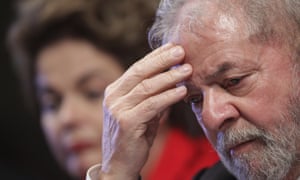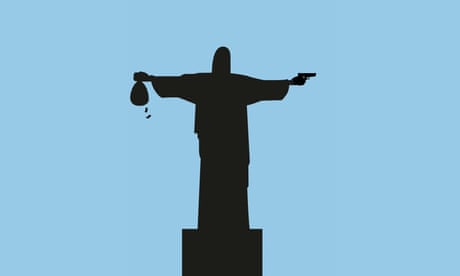Numa decisão largamente esperada pelo país, o juíz Sérgio Moro condenou o ex-presidente Luiz Inácio Lula da Silva a 9 e 1/2 anos de prisão como réu de processo tramitando no âmbito da Operação Lava Jato.
Segundo manchete do Le Monde, desde Paris, "O ex-presidente Lula é condenado a nove anos e meio de prisão por corrupção". Em outra notícia (vide ao final), o jornal francês divulga a surpreendente decisão da Igreja Católica em relação ao regime do presidente Nicolás Maduro na Venezuela, uma radical mudança de posição que poderá influenciar inclusive a atitude dos católicos em outros países da região em relação a seus próprios governos.
A agência Reuters divulgou notícia intitulada "Ex-presidente Lula sentenciado a prisão após acusado por corrupção".
Já o New York Time informou: "Ex-presidente do Brasil sentenciado a quase 10 anos de prisão por corrupção".
Leia abaixo o texto original das matérias.
Brésil : l’ancien président Lula condamné à neuf ans et demi de prison pour corruption
Icône de la gauche, Lula, qui a présidé le Brésil de 2003 à 2010, restera en liberté jusqu’à son procès en appel.
Le Monde.fr avec AFP et Reuters | 12.07.2017 à 19h47 • Mis à jour le 12.07.2017 à 20h11
Le juge Sergio Moro a condamné, mercredi 12 juillet, l’ancien président brésilien Luiz Inacio Lula da Silva à neuf ans et demi de prison pour des faits de corruption et blanchiment d’argent dans la première des cinq affaires de corruption le concernant. L’icône de la gauche latino-américaine, qui a présidé le Brésil de 2003 à 2010, restera en liberté jusqu’à son procès en appel.
Le magistrat l’a reconnu coupable d’avoir bénéficié de largesses à hauteur de 3,7 millions de réais (1,06 million d’euros) de la part d’OAS, une société de BTP. Il aurait reçu un triplex dans la station balnéaire de Guaruja, en remerciement de son intervention pour l’attribution de contrats avec la compagnie pétrolière publique Petrobras.
Lors de son procès, en mai, l’ancien chef de l’Etat avait affirmé n’avoir « jamais sollicité et jamais reçu le moindre appartement ».
L’ancien ouvrier métallurgiste est visé par cinq procédures judiciaires liées à l’opération « Lavage express ». Cette enquête tentaculaire a révélé un vaste réseau de corruption orchestré par des entreprises du bâtiment pour truquer systématiquement les marchés publics, notamment ceux du géant pétrolier étatique Petrobras.
Ce verdict compromet les chances de l’ancien chef de l’Etat de se présenter à la présidentielle de 2018. Malgré les affaires et un niveau élevé de rejet, il est largement en tête des intentions de vote.
AGÊNCIA REUTERS
Brazil's ex-president Lula sentenced to prison after corruption conviction
Luiz Inacio Lula da Silva, a two-term president, sentenced to nine and a half years in prison in first of five graft trials

Brazil’s former president Luiz Inácio Lula da Silva has been convicted on corruption charges. Photograph: Eraldo Peres/AP
Reuters in Brasilia
Wednesday 12 July 2017 18.50
Former Brazilian leader Luiz Inacio Lula da Silva, who rose from childhood poverty to become a two-term president, has been convicted on corruption charges in the first of five graft trials he faces.
He was sentenced to nine and a half years in prison, but will remain free on appeal.
The ruling marked a stunning fall for Lula, Brazil’s first working-class president, who left office six years ago with an 83% approval rating. The former union leader won global admiration for transformative social policies that helped reduce stinging inequality in Latin America’s biggest country.
Barack Obama once labeled him the most popular politician on Earth.
The verdict represented the highest-profile conviction yet in the sweeping corruption investigation that for over three years has rattled Brazil, revealing a sprawling system of graft at top levels of business and government, and throwing the country’s political system into disarray.
Judge Sergio Moro found Lula guilty of accepting 3.7m reais ($1.2m) worth of bribes from engineering firm OAS SA, the amount prosecutors said the company spent refurbishing a beach apartment for Lula in return for his help winning contracts with the state oil company Petroleo Brasileiro, or Petrobras.

Operation Car Wash: Is this the biggest corruption scandal in history?
Federal prosecutors have accused Lula, who first took the presidency in 2003, of masterminding a long-running corruption scheme that was uncovered in a probe into kickbacks around Petrobras.
Lula’s legal team has previously said they would appeal any guilty ruling. They have continuously blasted the trial as a partisan witch-hunt, accusing Moro of being biased and out to get Lula for political reasons.
Moro has denied the accusations.
Lula’s lawyers did not immediately respond to requests for comment.
Senator Gleisi Hoffmann, the head of the Workers party, lashed out at the ruling, saying Lula was convicted to prevent him from running for the presidency next year. She said the party would protest the decision and was confident the ruling would be overturned on appeal.
Despite the conviction and other charges against him, Lula remains a popular figure among many Brazilian voters, according to recent polls, and has said he wants to run again for the top office next year.
But he would be barred from office if his guilty verdict is upheld by an appeals court, which is expected to take at least eight months to rule.
If he cannot run, political analysts say Brazil’s left will be thrown into disarray, forced to rebuild and somehow find a leader who can emerge from the immense shadow that Lula has cast on Brazilian politics for three decades.
THE NEW YORK TIMES
Ex-President of Brazil Sentenced to Nearly 10 Years in Prison for Corruption By ERNESTO LONDOÑOJULY 12, 2017
The former Brazilian president Luiz Inácio Lula da Silva during a news conference last year in São Paulo. Credit Lalo de Almeida for The New York Times RIO DE JANEIRO — The former president of Brazil, Luiz Inácio Lula da Silva, was found guilty of corruption and money laundering on Wednesday and sentenced to nearly 10 years in prison, a stunning setback for a politician who has wielded enormous influence across Latin America for decades.
The case against Mr. da Silva, who raised Brazil’s profile on the world stage as president from 2003 to 2010, stemmed from charges that he and his wife illegally received about $1.1 million in improvements and expenses for a beachfront apartment from a construction company.
In return, prosecutors said, the company was able to obtain lucrative contracts from Petrobras, the state-controlled oil giant.
Plagued by scandals, Mr. da Silva’s leftist Workers’ Party lost the presidency last year when the Senate impeached his handpicked successor, Dilma Rousseff, in a power struggle that consumed the nation.
Mr. da Silva can appeal the conviction, but the ruling could deliver a serious blow to his plans for a political comeback.
Newsletter Sign UpContinue reading the main story The Interpreter Newsletter Understand the world with sharp insight and commentary on the major news stories of the week.
The sentence is the latest salvo by Brazil’s judicial branch, which has declared war on the country’s entrenched culture of corruption. Brazil’s current president, Michel Temer, was charged last month with corruption.
Judge Sergio Moro, who issued Wednesday’s verdict and oversees cases stemming from a broad graft scandal surrounding the state-controlled oil company, said Mr. da Silva’s actions were part of a “scheme of systemic corruption” in Petrobras.
“The president of the republic has enormous responsibilities,” Judge Moro wrote. “As such, his culpability is also” enormous when he commits crimes, he added.
L'Eglise catholique dénonce une "dictature" au Venezuela

Des manifestants anti-Maduro marchent vers le siège de l'Eglise catholique à Caracas, le 22 avril 2017
afp.com - FEDERICO PARRA
07 JUIL 2017
AFP
L'Eglise catholique vénézuélienne a accusé vendredi le gouvernement du président socialiste Nicolas Maduro d'être une "dictature" qui sera renforcée avec l'élection le 30 juillet d'une Assemblée constituante.
"Il ne s'agit plus d'un conflit idéologique entre la droite et la gauche", mais d'"une lutte entre un gouvernement devenu une dictature et tout un peuple qui réclame la liberté", a déclaré devant la presse monseigneur Diego Padron, président de la Conférence épiscopale vénézuélienne.
Le pays sud-américain est déchiré par sa pire crise politique et économique depuis des décennies et depuis trois mois, les opposants au président Maduro manifestent presque chaque jour pour exiger son départ. Les violences autour de ces rassemblements ont fait 91 morts jusqu'à présent.
"Cette assemblée prévue pour fin juillet sera imposée par la force et le résultat sera l'inscription dans la Constitution d'une dictature militaire, socialiste, marxiste et communiste", a mis en garde vendredi monseigneur Padron, qui s'exprimait à l'ouverture de l'assemblée annuelle des évêques vénézuéliens.
Pour l'Eglise, dont les relations avec le gouvernement socialiste sont régulièrement tendues, la Constituante permettra "au gouvernement actuel de rester au pouvoir pour une durée illimitée et d'annuler tous les pouvoirs publics comme l'Assemblée nationale", unique institution contrôlée par l'opposition de centre droit.
Le président de la Conférence épiscopale a autorisé que tous les locaux appartenant à l'Eglise, à l'exception des lieux de culte, soient utilisés par l'opposition au moment du référendum qu'elle souhaite organiser, le 16 juillet, sur le projet de Constituante.
Souvent critiquée par le président Maduro pour ses prises de position jugées trop proches de l'opposition, l'Eglise avait joué les médiatrices lors d'une tentative de dialogue entre les deux camps fin 2016, qui avait échoué.